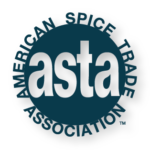 ASTA provides information on imports, sanctions, and transport restrictions
ASTA provides information on imports, sanctions, and transport restrictions
Finding requirements on importing food and specifically spices into the United States can be a daunting task due to the number of federal agencies involved in oversight activities. ASTA is providing links to several resources in an effort to assist companies in locating information relating to importation and also assist in helping companies track the volume of imported spices.
ASTA Trade and Tariff document
U.S. policy on trade and tariffs continues to change and evolve. ASTA created an FAQ document for membership that answers basic trade and tariff questions that may be applicable to ASTA membership. The document will be updated to reflect the latest information and changes.
Import Volume/Spice Consumption Data
The U.S. Department of Agriculture provides data on the volume of spice imported each year, broken out by individual spices when appropriate based on volume. From this data, USDA estimated annual per capita consumption. Data can be found on Economic Research Service (ERS) Web site. Please note that data runs several years behind current date.
To access the information go to the FADS web page, scroll down to “Date Set” in the middle of the page and click on Coffee, Tea, Cocoa and Spices. It will open a spreadsheet that has the most recent data collection as compiled by ERS.
For information on global spice trade statistics, the USDA Foreign Agricultural Service’s Global Agricultural Trade System (GATS) includes international trade statistics dating from the inception of the Harmonized coding system in 1989 to present. This information can be looked at on a monthly basis.
The easiest way to access the information is to use the “Quick Query Tool” found in the lower left side of the screen. Enter three key pieces of information as follows:
Product Type: Select “Imports – general”
Product Group: Select “Spices” from the “Sugar and Tropical Producta” category
OR
Select “Vegetables, Dried/Dehydr” from the Vegetables and Preparations category
OR
Select “”Field Crop Seeds” from the Planting Seeds category
Partner: Select “World Total”
The Quick Query tool gives a preliminary response through the standard query template and this can be fine-tuned for a more refined product selection including quantity, value, time period, etc. Tables are typically provided in condensed format and fields can be expanded wherever the “+” signs are available. Data can then be saved offline as a pdf or excel file.
Industry Guidance on Prior Notice for Entry
FDA published additional guidance for industry on prior notice of imported food that has been refused entry by another country as required by Section 304 of FSMA. A person submitting prior notice of imported food must report the name of any country to which the article has been refused entry. The newest version of the guidance includes frequently asked questions about the prior notice requirements to assist with the legal requirements of this rule.
Verification of Foreign Suppliers
The Food Safety Modernization Act (FSMA) intends to provide adequate assurances that food imported into the U.S. is produced in a manner that provides the same level of public health protection as foods produced domestically as required under section 418 (concerning hazard analysis and preventive controls) or 419 (concerning produce safety) of the Federal Food Drug, and Cosmetic Act (FD&C Act), as appropriate, and in compliance with sections 402 (concerning adulteration) and 403(w) (concerning misbranding regarding allergen labeling) of the FD&C Act.
FSMA will hold importers accountable for verifying that their foreign suppliers are implementing modern, prevention-oriented food safety practices and achieving the same level of food safety as domestic growers and processors.
ASTA offers educational resources to help navigate the import requirements of FSMA. For more information go to Past Webinars for Download to access recordings on this topic.
USDA Treatment Manual (for Noxious Weed Seeds)
The procedures and treatment schedules listed in this USDA Plant Protection and Quarantine (PPQ) manual include treatment of commodities (including spices) that prevent the movement of agricultural pests into or within the United States. The USDA Treatment Manual covers treatments for quarantine significant plant pests for imported and domestic commodities. Included in the Manual are current accepted procedures for noxious weed seeds in spices. The Manual includes chemical and non-chemical treatments, residue monitoring, treatments schedules, certifying facilities and other information that may be of interest to spice companies.
10 + 2 Import Rules
Effective January 26th, 2010 all companies must comply with the Importer Security Filing and Additional Carrier Requirements (known as 10+2).
Bioterrorism Act
Following the events of September 11, 2001, the U.S. Congress passed the Public Health Security and Bioterrorism Preparedness and Response Act of 2002. Learn about the four sections of particular importance to ASTA members.
FDA Import Program
Spices are subject to examination by FDA when they are being imported or offered for import into the U.S. The FDA Import Program includes industry resources such as import alerts, admissibility determinations for shipments of foreign origin, and import refusals among other items.
FDA Export Certificate
An FDA-issued “Certificate to a Foreign Government” is available for conventional foods, food additives, food contact substances and infant formula that meet the applicable requirements of the Federal Food, Drug and Cosmetics Act for marketing in the United States. This certificate states, among other things, that a product may be marketed in and legally exported from the United States.



